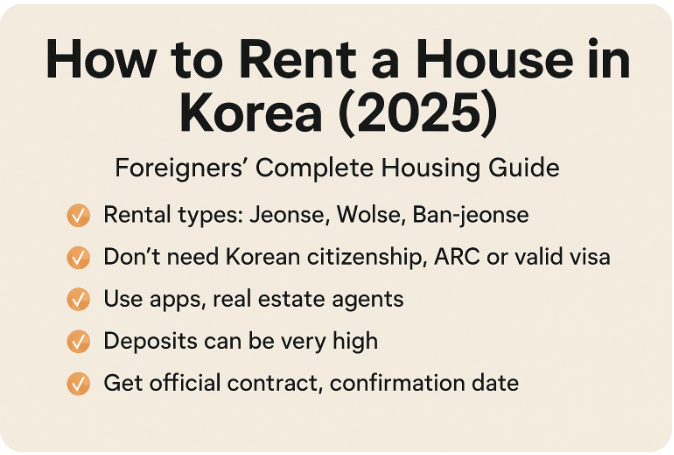Renting a Home in Korea: Step-by-Step Guide for Foreigners in 2025
※ This article is based on official information as of July 2025.
Everything you need to know about renting in Korea—types of housing, contracts, deposits, apps, and how to avoid scams as a foreigner.
💡 Key Points at a Glance
- Rental types in Korea: Jeonse (lump-sum), Wolse (monthly rent), Ban-jeonse (mixed)
- You don’t need Korean citizenship, but you must have an ARC or valid visa
- Use trusted apps like Zigbang or Dabang, or go through a local real estate agent
- Deposits can be very high, so plan your budget carefully
- Always insist on an official contract with confirmation date (확정일자) and use bank transfer for safety
🏠 Why Renting in Korea Can Be Overwhelming at First
New country. New language. New systems.
You’re excited to live in Korea—but when you start looking for a place to live, it suddenly feels impossible.
What does “jeonse” mean? Why are deposits so high? Who can I trust?
For foreigners, the Korean housing market can seem confusing and intimidating.
But here’s the good news: you’re not alone, and this guide will help you navigate it all step by step.
🧭 Understanding Korea’s Rental System
| Type | Description | Deposit Range | Monthly Rent |
|---|---|---|---|
| Jeonse | Lump-sum lease; no monthly rent | ₩100M–₩500M+ | ₩0 |
| Wolse | Regular monthly rent | ₩5M–₩20M+ | ₩300K–₩1M+ |
| Ban-jeonse | Medium deposit + lower monthly rent | ₩30M–₩100M | ₩200K–₩600K |
🔹 Jeonse is rare among foreigners due to the huge deposit required
🔹 Most foreign residents choose Wolse or Ban-jeonse
👤 Real-Life Case: A Vietnamese Student in Busan
“I tried to find a place using online apps, but I kept getting rejected because I was a foreigner.
Then I walked into a 부동산 (real estate agency) with a Korean friend. That changed everything.
I found a clean one-room near my university for ₩7 million deposit and ₩450,000 per month.
Without that friend, I would’ve missed out on signing safely.”
🔑 How to Rent a House in Korea as a Foreigner
1. Confirm Your Visa and ARC Status
- You must have a valid visa or Alien Registration Card (ARC)
- Tourist visa holders are not eligible for long-term leases
2. Set Your Budget and Preferred Type
- Decide between Jeonse, Wolse, or Ban-jeonse
- Don’t forget to include maintenance fees (₩50,000–₩200,000/month)
3. Use Trusted Apps or Visit Local Agents
- Download Zigbang (https://www.zigbang.com) or Dabang (https://www.dabangapp.com)
- You can also visit a nearby 부동산 (real estate office) in your area
- Expat Facebook groups can also offer leads, but double-check every listing
4. Visit the Property In-Person
- Inspect for mold, heating system, noise, and building security
- Ask to see the property registration certificate (등기부등본)
5. Sign a Legal Lease Contract
- Must include: rent, deposit, address, landlord & tenant details, contract term
- Immediately visit the local community center to get a confirmation date (확정일자) on the contract—this protects your deposit
6. Make a Bank Transfer Only
- Always pay deposit and rent via Korean bank account transfer
- Never give cash without receipts or official documents
📍 Regional Tips: Renting in Different Parts of Korea
| Region | Tip |
|---|---|
| Seoul | High prices, more options, but beware of scams |
| Gyeonggi | Popular for families, cheaper than Seoul, longer commute |
| Busan | Lower prices, less competition, easier for new residents |
| Jeju | Beautiful views, limited rental options, many landlords prefer locals |
❓ Frequently Asked Questions (FAQ)
Q1. Can I rent a home even if I don’t speak Korean?
Yes, but it’s highly recommended to have a Korean-speaking friend or agent help you. Many contracts and negotiations are in Korean.
Q2. What’s the safest way to pay the deposit?
Use a Korean bank transfer. Avoid cash. Always keep signed contracts and confirmation dates.
Q3. What if I get scammed or feel unsure?
Call 1345 (Immigration Call Center) or file a report via the Korea Consumer Agency at https://www.kca.go.kr
🔗 Useful Official Links
- HiKorea – Immigration & Living Guide
- Zigbang Rental App (English)
- Dabang Housing App
- Korea Consumer Agency
❤️ Final Thought: The First Place You Call “Home”
It might just be a one-room studio at first.
But once you sign that lease and get your own key, something changes.
You’re not just visiting Korea anymore.
You’re living here.
So take your time, protect your deposit, and ask for help when you need it.
Because this isn’t just a contract—it’s the beginning of your life in Korea.
🤝 One Last Thing to Share
📩 Know someone preparing to move to Korea?
A fellow student, teacher, or digital nomad friend?
Send them this guide.
Because good housing advice doesn’t just save money—it gives peace of mind.
